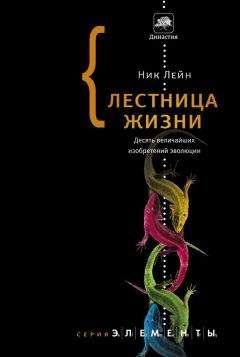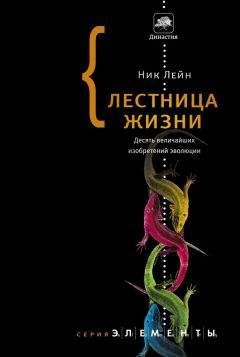Russell, R. J., Gerike, U., Danson, M. J., Hough, D. W., Taylor, G. L. Structural adaptations of the cold-active citrate synthase from an Antarctic bacterium // Structure 6: 351–361; 1998.
Глава 1. Происхождение жизни
Fyfe, W. S. The water inventory of the Earth: fluids and tectonics // Geological Society, London, Special Publications 78:1–7; 1994.
Holm, N. G., et al. Alkaline fluid circulation in ultramafic rocks and formation of nucleotide constituents: a hypothesis // Geochemical Transactions 7: 7; 2006.
Huber, C., Wachtershauser, G. Peptides by activation of amino acids with CO on (Ni,Fe)S surfaces: implications for the origin of life // Science 281: 670–672; 1998.
Kelley, D. S., Karson, J. A., Fruh-Green, G. L., et al. A serpentinite-hosted ecosystem: the Lost City hydrothermal field // Science 307:1428–1434; 2005.
Martin, W., Baross, J., Kelley, D., Russell, M. J. Hydrothermal vents and the origin of life // Nature Reviews in Microbiology 6: 805–814; 2008.
Martin, W., Russell, M. J. On the origin of biochemistry at an alkaline hydrothermal vent // Philosophical Transactions of the Royal Society of London В 362:1887–1925; 2007.
Morowitz, H., Smith, E. Energy flow and the organisation of life // Complexity 13: 51–59; 2007.
Proskurowski, G., et al. Abiogenic hydrocarbon production at Lost City hydrothermal field // Science 319: 604–607; 2008.
Russell, M. J., Martin, W. The rocky roots of the acetyl CoA pathway // Trends in Biochemical Sciences 29: 358–363; 2004.
Russell, M. First life // American Scientist 94: 32–39; 2006.
Smith, E., Morowitz, H. J. Universality in intermediary metabolism // Proceedings of the National Academy of Sciences USA 101: 13 168-13173; 2004.
Wächtershauser, G. From volcanic origins of chemoautotrophic life to bacteria, archaea and eukarya // Philosophical Transactions of the Royal Society of London В 361:1787–1806; 2006.
Глава 2. ДНК
Baaske, P., et al. Extreme accumulation of nucleotides in simulated hydrothermal pore systems // Proceedings of the National Academy of Sciences USA 104: 9346–9351; 2007.
Copley, S. D., Smith, E., Morowitz, H. J. A mechanism for the association of amino acids with their codons and the origin of the genetic code // Proceedings of the National Academy of Sciences USA 102: 4442–4447;2005.
Crick, F. H. C. The origin of the genetic code // Journal of Molecular Biology 38: 367–379; 1968.
De Duve, C. The onset of selection // Nature 433: 581–582; 2005. Freeland, S. J., Hurst, L. D. The genetic code is one in a million // Journal of Molecular Evolution 47: 238–248; 1998.
Gilbert, W. The RNA world // Nature 319: 618; 1986.
Hayes, В. The invention of the genetic code // American Scientist 86: 8–14; 1998.
Koonin, E. V., Martin, W. On the origin of genomes and cells within inorganic compartments // Trends in Genetics 21: 647–654; 2005.
Leipe, D., Aravind, L., Koonin, E. V. Did DNA replication evolve twice independently? // Nucleic Acids Research 27: 3389–3401; 1999.
Martin, W., Russell, M. J. On the origins of cells: a hypothesis for the evolutionary transitions from abiotic geochemistry to chemoautotrophic prokaryotes, and from prokaryotes to nucleated cells // Philosophical Transactions of the Royal Society of London В 358: 59–83; 2003.
Taylor, F. J. R., Coates, D. The code within the codons // Biosystems 22:177–187; 1989.
Watson, J. D., Crick, F. H. C. A structure for deoxyribose nucleic acid // Nature 171: 737–738; 1953.
Глава 3. Фотосинтез
Allen, J. F., Martin, W. Outofthin air // Nature 445: 610–612; 2007.
Allen, J. F. A redox switch hypothesis for the origin of two light reactions in photosynthesis // FEBS Letters 579: 963–968; 2005.
Dalton, R. Squaring up over ancient life // Nature 417:782–784; 2002.
Ferreira, K. N.. et al. Architecture of the photosynthetic oxygen-evolving center // Science 303:1831–1838; 2004.
Mauzerall, D. Evolution of porphyrins — life as a cosmic imperative // Clinics in Dermatology 16; 195–201; 1998.
Olson, J. M., Blankenship, R. E. Thinking about photosynthesis // Photosynthesis Research 80: 373–386; 2004.
Russell, M. J., Allen, J. F., Milner-White, E. J. Inorganic complexes enabled the onset of life and oxygenic photosynthesis / In: Energy from the Sun: 14th International Congress on Photosynthesis. Allen, J. F., Gantt, E., Golbeck, J. H., Osmond B., eds. Springer 1193–1198; 2008.
Sadekar, S., Raymond, J., Blankenship, R. E. Conservation of distantly related membrane proteins: photosynthetic reaction centers share a common structural core // Molecular Biology and Evolution 23: 2001–2007; 2006.
Sauer, K., Yachandra, V. К. A possible evolutionary origin for the MnA cluster of the photosynthetic water oxidation complex from natural MnO2 precipitates in the early ocean // Proceedings of the National Academy of Sciences USA 99: 8631–8636; 2002.
Walker, D. A. The Z-scheme — Downhill all the way // Trends in Plant Sciences 7:183–185; 2002.
Yano, J., et al. Where water is oxidised to dioxygen: structure of the photosynthetic Mn4Ca cluster // Science 314: 821–825; 2006.
Глава 4. Сложная клетка
Сох, С. J., et al. The archaebacterial origin of eukaryotes // Proceedings of the National Academy of Sciences USA 105: 20 356-20361; 2008.
Embley, M. T., Martin, W. Eukaryotic evolution, changes and challenges // Nature 440: 623–630; 2006.
Javaeux, E. J. The early eukaryotic fossil record // Origins and Evolution of Eukaryotic Endomembranes and Cytoskeleton. Ed. Gáspár Jékely. Landes Bioscience 2006.
Koonin, E. V. The origin of introns and their role in eukaryogenesis: a compromise solution to the introns-early versus introns-late debate? // Biology Direct 1: 22; 2006.
Lane, N. Mitochondria: key to complexity / In: Origin of Mitochondria and Hydrogenosomes. Martin, W., Muller, M., eds. Springer, 2007.
Martin, W., Koonin, E. V. Introns and the origin of nucleus-cytosol compartmentalisation // Nature 440: 41–45; 2006.
Martin, W., Muller, M. The hydrogen hypothesis for the first eukaryote // Nature 392: 37–41; 1998.
Pisani, D, Cotton, J. A., McInerney, J. O. Supertrees disentangle the chimerical origin of eukaryotic genomes // Molecular Biology and Evolution 24:1752–1760; 2007.
Sagan, L. On the origin of mitosing cells // Journal of Theoretical Biology 14: 255–274; 1967.
Simonson, A. B., et a l. Decoding the genomic tree of life // Proceedings of the National Academy of Sciences USA 102: 6608–6013; 2005.
Taft, R. J., Pheasant, M., Mattick, J. S. The relationship between non-proteincoding DNA and eukaryotic complexity // BioEssays 29: 288–299; 2007.
Vellai, Т., Vida, G. The difference between prokaryotic and eukaryotic cells // Proceedings of the Royal Society of London В 266:1571–1577; 1999.
Глава 5. Секс
Burt, A. Sex, recombination, and the efficacy of selection: was Weismann right? // Evolution 54: 337–351; 2000.
Butlin, R. The costs and benefits of sex: new insights from old asexual lineages // Nature Reviews in Genetics 3: 311–317; 2002.
Cavalier-Smith, T. Origins of the machinery of recombination and sex // Heredity 88:125–141; 2002.
Dacks, J., Roger, A. J. The first sexual lineage and the relevance of facultative sex // Journal of Molecular Evolution 48: 779–783; 1999.
Felsenstein, J. The evolutionary advantage of recombination // Genetics 78: 737–756;1974.
Hamilton, W. D., Axelrod, R.,Tanese, R. Sexual reproduction as an adaptation to resist parasites // Proceedings of the National Academy of Sciences USA 87: 3566–3573; 1990.
Howard, R. S., Lively, C. V. Parasitism, mutation accumulation and the maintenance of sex // Nature 367: 554–557; 1994.
Keightley, P. D., Otto, S. P. Interference among deleterious mutations favours sex and recombination in finite populations // Nature 443: 89–92; 2006.
Kondrashov, A. Deleterious mutations and the evolution of sexual recombination // Nature 336: 435–440; 1988.
Otto, S. P., Nuismer, S. L. Species interactions and the evolution of sex // Science 304:1018–1020; 2004.
Szollosi, G. J., Derenyi, I., Vellai, T. The maintenance of sex in bacteria is ensured by its potential to reload genes // Genetics 174: 2173–2180; 2006.
Глава 6. Движение
Amos, L. A., van den Ent, F., Lowe, J. Structural/functional homology between the bacterial and eukaryotic cytoskeletons // Current Opinion in Cell Biology 16: 24–31; 2004.
Frixione, E. Recurring views on the structure and function of the cytoskeleton: a 300 year epic // Cell Motility and the Cytoskeleton 46: 73–94;2000.
Huxley, H. E., Hanson, J. Changes in the cross striations of muscle during contraction and stretch and their structural interpretation // Nature 173: 973–976; 1954.
Huxley, H. E. A personal view of muscle and motility mechanisms // Annual Review of Physiology 58:1–19; 1996.
Mitchison, T. J. Evolution of a dynamic cytoskeleton // Philosophical Transactions of the Royal Society of London В 349: 299–304; 1995.
Nachmias, V. T., Huxley, H., Kessler, D. Electron microscope observations on actomyosin and actin preparations from Physarum polycephalum, and on their interaction with heavy meromyosin subfragment I from muscle myosin // Journal of Molecular Biology 50: 83–90; 1970.
Oota, S., Saitou, N. Phylogenetic relationship of muscle tissues deduced from superimposition of gene trees // Molecular Biology and Evolution 16: 856–867; 1999.
Piccolino, M. Animal electricity and the birth of electrophysiology: The legacy of Luigi Galvani // Brain Research Bulletin 46: 381–407; 1998.
Richards, T. A., Cavalier-Smith, T. Myosin domain evolution and the primary divergence of eukaryotes // Nature 436:1113–18; 2005.
Swank, D. M., Vishnudas, V. K., Maughan, D. W. An exceptionally fast actomyosin reaction powers insect flight muscle // Proceedings of the National Academy of Sciences USA 103:17 543-7; 2006.
Wagner, P. J., Kosnik, M. A., Lidgard, S. Abundance distributions imply elevated complexity of post-paleozoic marine ecosystems // Science 314:1289–92; 2006.
Глава 7. Зрение
Addadi, L., Weiner, S. Control and Design Principles in Biological Mineralisation // Angewandte Chemie International Edition 3:153–169; 1992.
Aizenberg, J., et al. Calcitic microlenses as part of the photoreceptor system in brittlestars // Nature 412: 819–822; 2001.
Arendt, D., et al. Ciliary photoreceptors with a vertebrate-type opsin in an invertebrate brain // Science 306: 869–871; 2004.
Deininger, W., Fuhrmann, M., Hegemann, P. Opsin evolution: out of wild green yonder? // Trends in Genetics 16:158–159; 2000.
Gehring, W. J. Historical perspective on the development and evolution of eyes and photoreceptors // International Journal of Developmental Biology 48: 707–717; 2004.
Gehring, W. J. New perspectives on eye development and the evolution of eyes and photoreceptors //Journal of Heredity 96:171–184; 2005.
Nilsson, D. E., Pelger, S. A pessimistic estimate of the time required for an eye to evolve И Proceedings of the Royal Society of London В 256: 53–58;1994.
Panda, S., et al. Illumination of the melanopsin signaling pathway // Science 307: 600–604; 2005.
Piatigorsky, J. Seeing the light: the role of inherited developmental cascades in the origins of vertebrate lenses and their crystallins // Heredity 96: 275–277; 2006.
Shi, Y., Yokoyama, S. Molecular analysis of the evolutionary significance of ultraviolet vision in vertebrates // Proceedings of the National Academy of Sciences USA 100: 8308–8013; 2003.
Van Dover, C. L., et al. A novel eye in «eyeless» shrimp from hydrothermal vents on the Mid-Atlantic Ridge // Nature 337: 458–460; 1989.
White, S. N., et AL. Ambient light emission from hydrothermal vents on the Mid-Atlantic Ridge // Geophysical Research Letters 29: 341–344; 2000.
Глава 8. Теплокровность
Burness, G. P., Diamond, J., Flannery, T. Dinosaurs, dragons, and dwarfs: the evolution of maximal body size // Proceedings of the National Academy of Sciences USA 98:14 518-14523; 2001.
Hayes, J. P., Garland, J. The evolution of endothermy: testing the aerobic capacity model // Evolution 49: 836–847; 1995.
Hulbert, A. J., Else, P. L. Membranes and the setting of energy demand // Journal of Experimental Biology 208:1593–1599; 2005.
Kirkland, J. I., et al. A primitive therizinosauroid dinosaur from the Early Cretaceous of Utah // Nature 435: 84–87; 2005.
Klaassen, M., Nolet, B. A. Stoichiometry of endothermy: shifting the quest from nitrogen to carbon // Ecology Letters 11:1–8; 2008.
Lane, N. Reading the book of death // Nature 448:122–125; 2007.
O’Connor, P. M., Claessens, L. P. A. M. Basic avian pulmonary design and flow-through ventilation in non-avian theropod dinosaurs // Nature 436: 253–256; 2005.
Organ, C. L., et AL. Molecular phylogenetics of Mastodon and Tyrannosaurus rex // Science 320: 499; 2008.
Prum, R. O., Brush, A. H. The evolutionary origin and diversification of feathers // Quarterly Review of Biology 77: 261–295; 2002.
Sawyer, R. H., Knapp, L. W. Avian skin development and the evolutionary origin of feathers // Journal of Experimental Zoology 298B: 57–72; 2003.
Seebacher, F. Dinosaur body temperatures: the occurrence of endothermy and ectothermy // Paleobiology 29:105–122; 2003.
Walter, I., Seebacher, F. Molecular mechanisms underlying the development of endothermy in birds (Gallus gallus): a new role of PGC-1α? // American Journal of Physiology — Regulatory, Integrative and Comparative Physiology 293: R2315 — R2322; 2007.
Глава 9. Сознание
Churchland, P. How do neurons know? // Daedalus Winter 2004; 42–50.
Crick, F., Koch, C. A framework for consciousness // Nature Neuroscience 6:119–126; 2003.
Denton, D. A., et al. The role of primordial emotions in the evolutionary origin of consciousness // Consciousness and Cognition 18 (2): 500–514; 2009.
Edelman, G., Gally, J. A. Degeneracy and complexity in biological systems // Proceedings of the National Academy of Sciences USA 98: 13 763-13/68; 2001.
Edelman, G. Consciousness: the remembered present // Anna is of the New York Academy of Sciences 929:111–122; 2001.
Gil, M., De Marco, R. J., Menzel, R. Learning reward expectations in honeybees // Learning and Memory 14: 49–96; 2007.
Koch, C., Greenfield, S. How does consciousness happen? // Scientific American October 2007; 76–83.
Lane, N. Medical constraints on the quantum mind // Journal of the Royal Society of Medicine 93: 571–575; 2000.
Merker, B. Consciousness without a cerebral cortex: A challenge for neuroscience and medicine // Behavioral and Brain Sciences 30: 63–134; 2007.





